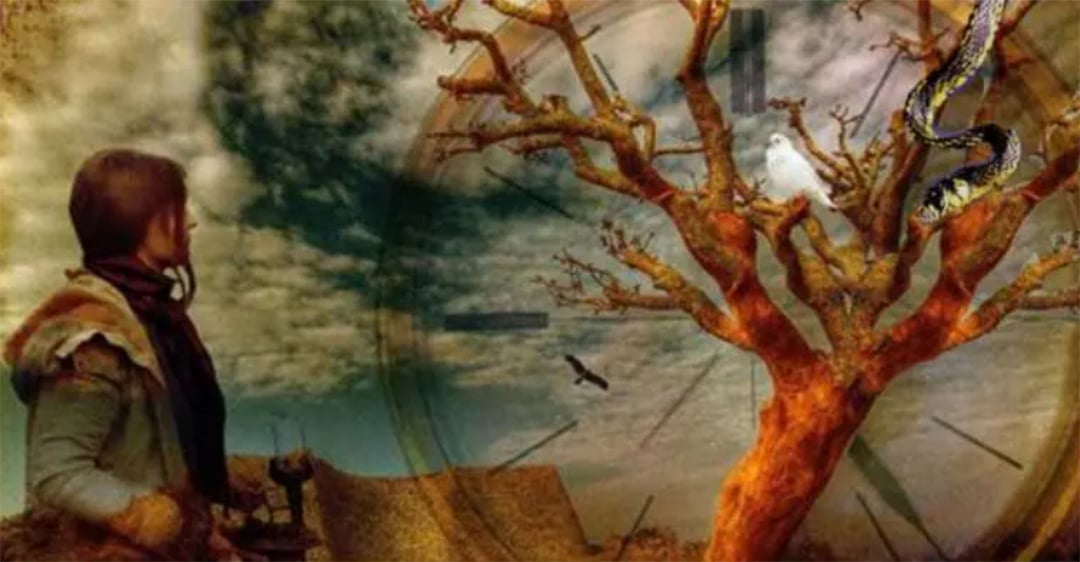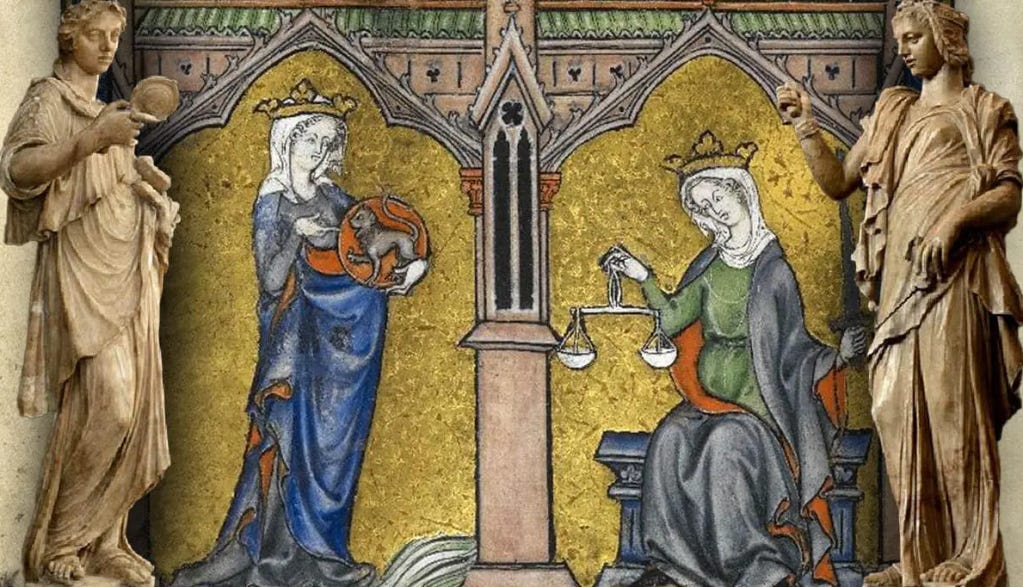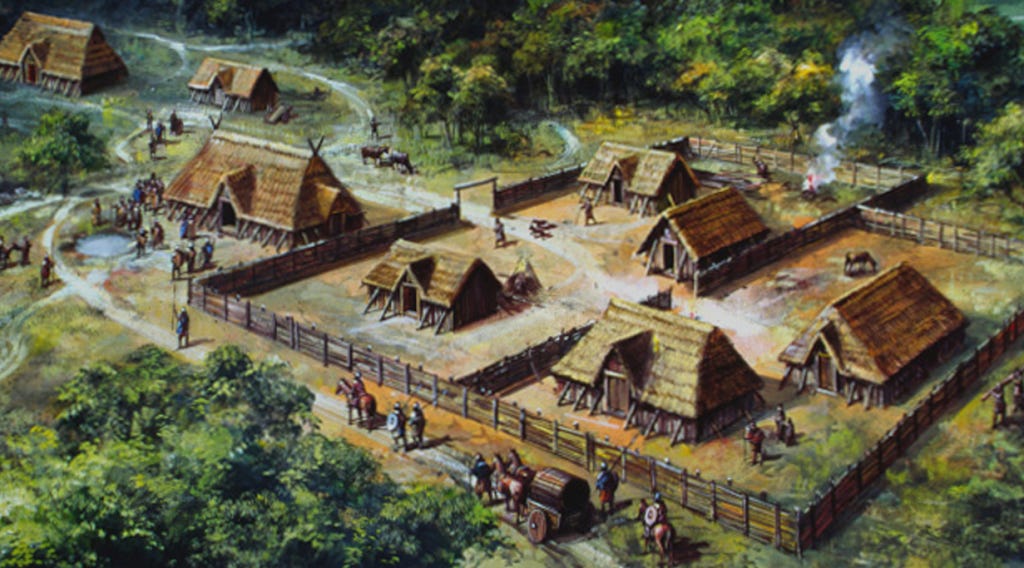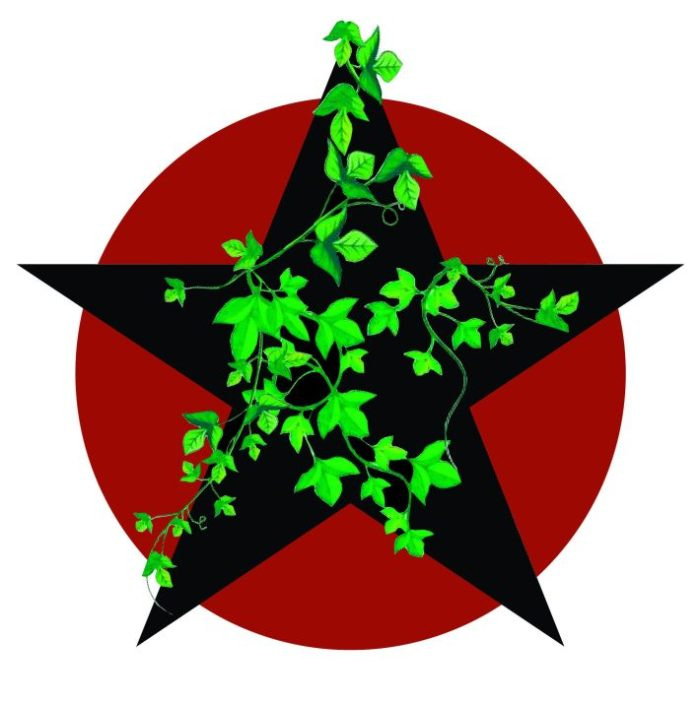

The Structure of a Whole Life (Revolutionary Aristotelianism Part 5)
by W.D. James | May 1, 2024
We are the Skyscraper Condemnation Affiliates
God save Tudor houses, antique tables, and billiards
Preserving the old ways from being abused
Protecting the new ways for me and for you
What more can we do?
We are the Village Green Preservation Societyi
– The Kinks, The Village Green Preservation Society
In the previous essay we saw Alasdair MacIntyre set out to retrieve an account of morality that would perceive values and goods as objective realities about which we could engage in practical reasoning together. Further, we got the idea that the ability to think of morality in this way was going to involve certain sociological structures which modernity had eviscerated. In this essay we’ll get down to the real nuts and bolts of his thinking.
Practices
MacIntyre’s theory of virtue ethics is centered and dependent on his notion of ‘practices.’ Let’s take an extended listen to how he explains this concept: “By a ‘practice’ I am going to man any coherent and complex form of socially established cooperative human activity through which goods internal to that form of activity are realized in the course of trying to achieve those standards of excellence which are appropriate to, and partially definitive of, that form of activity, with the result that human powers to achieve excellence, and human conceptions of the ends and goods involved, are systematically extended. Tic-tac-toe is not an example of a practice in this sense, nor is throwing a football with skill; but the game of football is, and so is chess. Bricklaying is not a practice; architecture is. Planting turnips is not a practice; farming is.”ii
So, the essential elements of what will count as a practice are:
- A coherent and complex cooperative activity
- With certain internal (or inherent) goods which are sought
- These goods are achieved while perfecting the excellences associated with the activity
- In perfecting these excellences, our powers and our conceptions of the goods are increased

Let’s illustrate with an example to make this clear. MacIntyre will illustrate with the example of chess. I prefer checkers. My great grandfather was tough enough to survive getting gassed in World War I and smart enough to farm with a team of horses until not long before he passed away: checkers was his game and in my mind it has always been a solid and dignified game. So, our practice will be the playing of checkers. This is a coherent and complex activity in that it does not have contradictory rules and the possibilities in any game are vast and the various strategies one might employ are complex.
Now we must distinguish between internal and external goods. External goods are the things not entailed in the practice itself which you might hope to gain. For instance, you might earn money or social prestige from playing checkers. Those may indeed be good things. However, they are external to the game itself: you can play the game well and never earn any money or gain any social prestige; also, you can obtain those goods in many other ways that have nothing to do with the practice of checkers. Internal goods are the good things that are inherent in checkers. They’re why the game was developed, grew, and endured as a social practice. Playing checkers develops certain imaginative and cognitive skills. It nourishes a sense of fair play and competition. It is a rather slow-paced and meditative game, so it brings peace. It’s not that you couldn’t get these sorts of goods some other way. It’s that you really can’t play checkers well without obtaining these goods.

There are also certain excellences associated with the playing of checkers. Everyone who knows how to play checkers knows what they are. Further, they know pretty well to what degree they possess them and once they’ve played an opponent, they know how well they possess them as well. We (the checkers players) all know who is good and who is bad. These would be things like the ability to accurately predict the game, or at least identify the possibilities a number of moves ahead. They would also involve certain psychological excellences like patience, honesty, and the ability to gauge one’s opponent and not be easily read oneself. These are genuine excellences in that one cannot be a good player without acquiring them and the degree to which one is a good player is basically just a measurement of how far along the path of acquiring these excellences one has progressed.
Finally, one’s powers and conceptions of the good increase as one becomes a good checkers player. If you have developed the patience required to play checkers well, you are now a more patient person and possess this power of character to a greater degree than previously and this will carry over into aspects of life beyond checkers. If one develops a reverent respect for the good of fair competition from mastering checkers, one’s conception of how to interact with others in other contexts is also expanded.
Now, let’s notice a few key points of what MacIntyre is revealing for us here. First, this is all completely objective. One is a good checkers player or one is not. If one lacks the excellences associated with the game and continually loses, no rational person will harbor the illusion that they are a good player. Further, all the other players will be able to form a very similar judgment of one’s ability. No one has to externally impose a view of the good. It’s inherent in the practice and all the participants will hold pretty similar conceptions of it. Where they differ, they share enough in common to have a rational discussion of that difference and may well be able to come more into agreement in their judgment. Also, it is essential that this is a socially recognized and developed practice. You can’t just go make up some game, be the only one who plays it and have any of the same characteristics attach to it. Yet further, we know what it is to become better. Also, having progressed in this one area better equips one to do well and appreciate the goods of other social practices. Finally, let’s observe that the standards of good are developed from within the social practice itself. They are not arbitrarily imposed. They develop naturally from the nature of the practice itself.
This may not sound very much like morality or an ethical theory. If not, that is because we are probably stuck with some rather modern conception of those. While acquiring the cognitive skills to develop a sound checkers strategy may not be strictly moral (at least in our modern sense), certainly the ability to play honestly starts to look pretty moral to us (and a good player will learn to play honestly because the internal goods are dependent on it; you might be tempted to play dishonestly to obtain an external good like the money you bet on the game, yet you and everyone else who plays checkers understands that this does not make you a good player or make the game itself more enjoyable).

Virtue
Now let us complete the transition of our moral vision to the Aristotelian-MacIntyrean perspective (for fun, let’s call this the MacIntotelian perspective). We have been talking of ‘excellences’ and we have had no difficulty recognizing what they would be. Now let’s recall that the Greek for ‘virtue’ is arete which simply means: excellence. This is an ethical view of the world in which right and wrong are not the primary moral terms. They don’t disappear. Checkers has rules and it’s right to follow them and wrong to violate them. But you don’t become a good checkers player by just following the rules. That is a very low level of accomplishment. You become a good player by perfecting the virtues associated with it.
Let’s imagine a person embedded in a whole range of practices. We’ll stick with my great grandfather if that’s ok. He was a good checkers player, so he developed all the virtues associated with that to a pretty high degree. These would include things like justice (not cheating, recognizing when he had lost, etc…). Also he was a soldier. Soldiers know what constitutes good soldiering. I have a citation he was awarded in a frame that I like to look at now and then (‘Columbia’, the feminine personification of America, much cooler than Uncle Sam, is apparently knighting him given that he is kneeling and she bears a sword). So, in practicing and becoming a good soldier he developed excellences, virtues, like self-discipline, courage, fortitude, and compassion (soldiers suffer together and the good ones recognize their enemies are very much like themselves).
He was a farmer. A good one. He developed virtues like thrift, ingenuity, hard work, as well as much broader things like an appreciation for, knowledge of, and respect for his soil, the animals he worked with, the animals he fed upon, the crops he grew, the ridge and creek system that made his plot of land productive, etc…. We could call this wisdom—he knew how a lot of things in the world work and how he properly fit into the overall scheme. He also formed a family and raised a pack of kids. He learned the virtues associated with intimacy and responsibility. He was a neighbor to the other residents of Pea Ridge. They worked together when it was in their interests and worked out how to handle interfamilial issues that came up. He was a citizen of Robertson County, Kentucky, and of the United States. At least at the level of his county, he knew what was going on, who was doing it, and had some meaningful impact on what happened there.
To the extent that he developed in the characteristic excellences of all of these practices and social associations he increased the degree of what both Aristotle and MacIntrye call eudaimonia, happiness, flourishing. If he can succeed across all these areas, a perception of what it is to be a good person in general also starts to appear to him. If he is in close contact with say the 40 or 50 families that lie in close proximity to him, mostly farmers like himself, but a storekeeper and pastor and maybe one or two other crafts practitioners thrown in, they all have enough in common and enough knowledge of how to do the things they all do together to be in pretty good agreement and together to talk things out and come to the sorts of rough agreements people come to in order to govern their collective lives. From MacIntyre’s perspective, they share an objective morality rooted in their shared lives and they are able to engage in practical reasoning together on things that matter: how to respond to a draught affecting them all, what is owed to a neighbor whose house burns down, what is fair recompense when your cow tramples your neighbor’s corn.

Apocalypse
Now let’s imagine how the forces of modernity might start to impact such a life, a life pretty much like most human lives up to that point. Perhaps checkers endures. Or maybe it’s displaced with simpler but more adrenaline-producing pastimes. Some of the virtues are lost. Is the culture of soldiering largely intact? To some extent. Perhaps external goods associated with gender ideology and what not have been inserted. Maybe what it is to be a good soldier becomes a bit less objective and less clear. Farming? More and more this is not for subsistence or a largely predictable local market. One is subjected to international fluctuations. To weather these one needs to expand and become big. This entails debt and finance. The overriding factors become less and less the internal goods of farming and land and livestock management but the ability to produce capital. I think those large agribusiness people know they are not good farmers. They are doing what they need to do to survive in the market. Families? By all indicators we have hardly any idea of the excellences associated with family formation and childrearing. We aren’t good at it anymore. Neighbors? They come and go more quickly. The farmer lives next to the town lawyer who buys up the cheap farmland and builds a McMansion. What do they have in common? Citizenship? Almost nothing is decided in the county. It’s national agricultural policy that determines your fate and you have absolutely no meaningful impact on that. Maybe you pay dues to a business association that hires lobbyists to go to Washington.
If that picture of the impact of modernizing tendencies is basically right, there are fewer opportunities to develop the excellences associated with the internal goods of practices, the practices themselves come under external pressure, and the bonds of social life largely disappear to be replaced with the administrative apparatus of faraway governments. The sociological foundation of shared lives pursuing excellences together is dissolved. As is our ability to morally reason with one another. So says MacIntyre.
Virtue, Community, Tradition and a Good Life
We have looked pretty closely at what virtue means and how it functions in this framework. Let’s fill out the rest of what would constitute a healthy moral environment. MacIntyre notes that to enter into a practice is to form social relationships with those who came before (all the previous checkers players who developed the game, evolved the rules, and served as models for what it was to do it well), all the current practitioners of the game (your fellow checkers players), and the future practitioners (for whose sake you will bother to pass along the practice and exact art of checkers playing).
This constitutes the genuine community of checkers players. As Aristotle observed, it is a sharing. In this case, of a love for checkers and respect for its integrity, and the desire to play it well.
As this community continues to exist through time, and to reason together about their shared practice, a tradition evolves. Let’s move to something a bit more complicated than checkers. Let’s say we also have a concern for how we are related to the whole and this takes the form of religion: its practice, poetry, and theology. As the community of Hari Krishnas continues through time, seeking to achieve the internal goods of Krishnaism, various challenges will come up. They will need to think through those together. If they do it well, they will remain a community and their shared faith will become more solicitous. The history of those challenges and the community’s response constitutes their tradition. The important thing here is that the notion of ‘progress’ that these folks hold will likewise arise naturally from within their shared history as joint practitioners. If they develop their faith so that it can respond to more and more challenges and unite them more and more, they will have achieved progress. Things are working better for their community. Without an intact shared tradition, no real progress. Only fragmentation.
On top of this tradition a broader conception of the good life for humanity can begin to emerge and serve as an ultimate aim, or telos, of what all of our particular practices ought to aim at. We have achieved an integral, humanistic, culture. Here’s the revelation. For MacIntyre, “the good life for man consists in seeking the good life for man.”iii That is, the good life consists in all the practices and all the social associations we develop seeking after various goods. The good life is what you get when you do all that well.

Institutions and Virtue Signaling
The foregoing is MacIntyre’s basic account of what we might paradoxically call the mechanics of organic development. The analysis of how organic order emerges, for what purposes, and how it can be thwarted. And thwarted it has been.
More and more of our organic interconnections have been replaced with administration and bureaucracy. They have been institutionalized. MacIntyre concisely notes: “Institutions are characteristically and necessarily concerned with what I have called external goods.” So much is contained in that short conceptualization. Is there a governmental bureaucracy anywhere that is set up to foster internal goods? Aren’t they driven by metrics, strategic goals, and outcomes? Those are external. Think of your own work life. How much emphasis does your organization place on the acquisition of internal goods and the development of the associated excellences? How much on external goods like profit, market share, etc…?
We like to make fun of people who merely ‘virtue signal’. At least I do. But let’s face it: the sociological basis for the development of real virtues is in shambles. We have very little virtue. We have the simulacra. We have the sign, but not the reality.
What is to be done? In discussing the fall of the Roman Empire, MacIntyre discerns a possible path forward as our own empire fades. I will quote his closing words at length: “A crucial turning point in that earlier history occurred when men and women of good will turned aside from the task of shoring up the Roman imperium and ceased to identify the continuation of civility and moral community with the maintenance of that imperium. What they set themselves to achieve instead—often not recognizing fully what they were doing—was the construction of new forms of community within which the moral life could be sustained so that both morality and civility might survive the coming age of barbarism and darkness. If my account of our moral condition is correct, we ought also to conclude that for some time now we too have reached that turning point. What matters at this stage is the construction of local forms of community within which civility and the intellectual and moral life can be sustained through the new dark ages which are already upon us. And if the tradition of the virtues was able to survive the horrors of the last dark ages, we are not entirely without grounds for hope. This time however the barbarians are not waiting beyond the frontiers, they have already been governing us for quite some time. And it is our lack of consciousness of this that constitutes part of our predicament. We are waiting not for Godot, but for another—doubtless very different—St. Benedict.”iv

Subscribe to Philosopher’s Holler
i Give it a listen: The Kinks – The Village Green Preservation Society (youtube.com)
ii Alasdair MacIntyre, After Virtue, 2nd ed., University of Notre Dame Press, 1984, p. 187.
iii Ibid, p. 219.
iv Ibid, p. 263. St. Benedict is widely recognized as the founder of Western monasticism. It was in those monasteries that the texts of the ancient world were preserved, copied, illuminated, and passed on to us. It was there that people organized communities devoted to ‘higher’ ideals.
This essay was first published on Winter Oak





0 Comments